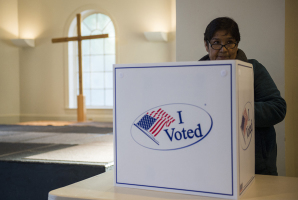Supreme Court Strikes Down Key Provision in Defense of Marriage Act
The Supreme Court struck down on Wednesday a key provision in the Defense of Marriage Act (DOMA) that denied benefits to legally married gay couples.
With a narrow vote of 5-4, married gay couples will now be able to receive the same tax, health and retirement benefits that are available to married heterosexual couples.
Reuters reported that hundreds of gay marriage supporters had gathered outside the Supreme Court on Wednesday, many of whom had waited for hours to hear the long-awaited decisions on DOMA and Proposition 8, a voter-approved amendment in California that defined marriage as a union between a man and a woman.
In March, the Supreme Court heard arguments on California's Proposition 8, Hollingsworth v. Perry case, before reviewing the federal Defense of Marriage Act in U.S. v. Windsor, but decided to hold off on a decision until June.
United States v. Windsor, which concerns DOMA, involves Edith Windsor of New York, who married her female partner in Canada, who later passed away in 2009. When Windsor inherited the property, DOMA prevented her from being seen as the lawful surviving spouse, and thus she faced a tax bill of close to $360,000 – something which would not have been the case if the government recognized same-sex marriage as equal with marriage between a man and a woman.
While most U.S. states uphold the traditional definition of marriage, same-sex couples are now allowed to get married in 12 U.S. states, as well as Washington, D.C.
A number of prominent political leaders have called for DOMA to be struck down, including President Barack Obama and former President Bill Clinton, who signed DOMA back in 1996. Obama has said that if he could, he'd strike down all bans on same-sex marriage.
Clinton, on the other hand, explained that circumstances of the time led him to sign DOMA. In March, the former president said that now times have changed, and he described the law as "unconstitutional."
"Among other things, these couples cannot file their taxes jointly, take unpaid leave to care for a sick or injured spouse or receive equal family health and pension benefits as federal civilian employees," Clinton said of same-sex couples. "Yet they pay taxes, contribute to their communities and, like all couples, aspire to live in committed, loving relationships, recognized and respected by our laws."
Most Christians, however, oppose the redefinition of marriage, insisting that it is a union solely between a man and a woman.
Eric Teetsel, executive director of the Manhattan Declaration, a movement of Christians from various denominations with traditional values working to preserve the sanctity of life, marriage and religious liberty, said earlier this week that regardless of the Supreme Court's decision, conservative Christians need to continue fighting for the culture of marriage and family.
"It took generations to erode marriage and family, with disastrous consequences. Restoration may take just as long," Teetsel said. "No matter this week's rulings, we will rededicate ourselves to renewing in American culture the profound beauty, mystery and holiness of faithful marriage. We will be patient in the light of any setbacks. And, in the end, we will succeed – if we do not give up."
Earlier in June, a New York Times/CBS News of 1,022 Americans found that the majority feel the federal government should allow states to continue dealing with marriage on their own. Sixty percent of those who responded to the poll said that it should be the states' prerogative, while only 33 percent said the federal government should have the right to define marriage.
The same poll found that 51 percent of Americans are in favor of legalizing gay marriage, while 44 percent oppose it.




























